五年级下册英语第一单元整理归纳
Unit1Myday(讲义)-人教PEP版英语五年级下册(1)
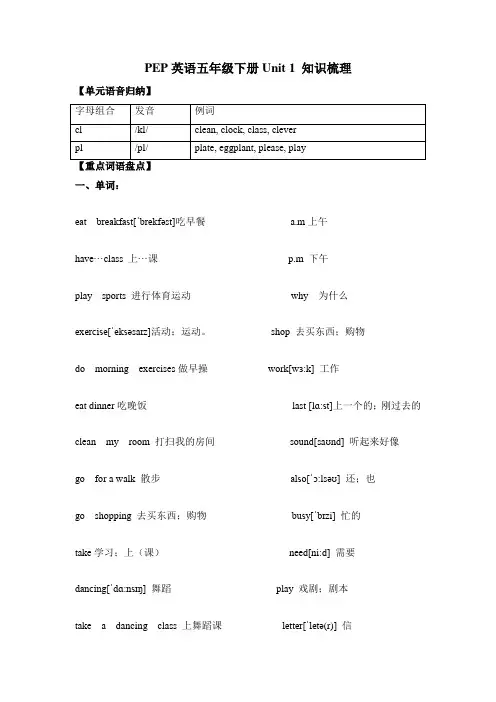
PEP英语五年级下册Unit 1 知识梳理【单元语音归纳】一、单词:eat breakfast[ˈbrekfəst]吃早餐 a.m上午have···class 上···课p.m 下午play sports 进行体育运动why 为什么exercise[ˈeksəsaɪz]活动;运动。
shop 去买东西;购物do morning exercises做早操work[wɜ:k] 工作eat dinner吃晚饭last [lɑ:st]上一个的;刚过去的clean my room 打扫我的房间sound[saʊnd] 听起来好像go for a walk 散步also[ˈɔ:lsəʊ] 还;也go shopping 去买东西;购物busy[ˈbɪzi] 忙的take学习;上(课)need[ni:d] 需要dancing[ˈdɑ:nsɪŋ] 舞蹈play 戏剧;剧本take a dancing class 上舞蹈课letter[ˈletə(r)] 信when 什么时候live[lɪv] 居住after 在(时间)后island[ˈaɪlənd] 岛start 开始always[ˈɔ:lweɪz] 总是;一直usually[ˈju:ʒuəli] 通常地cave[keɪv] 山洞Spain[speɪn] 西班牙go swimming 去游泳late[leɪt] 晚;迟win[wɪn] 获胜二、词语1. eat breakfast 吃早饭2. have…class 上……课3. play sports 进行体育活动4. exercise活动;运动5. do morning exercises 做早操6. eat dinner 吃晚饭7. clean my room 打扫我的房间8. go for a walk散步9. go shopping 去买东西;购物10. take 学习;上(课)11. dancing 跳舞;舞蹈12. take a dancing class 上舞蹈课13. go swimming去游泳【重点句型再现】1. 询问对方什么时间做某事的句型及答语—When do you finish class in the morning? 你们上午的课几点结束?—We finish class at 1 o’clock. 我们一点钟结束上午的课。
人教版五年级英语上册各单元以及下册unit1知识点详细归纳(附带练习题)
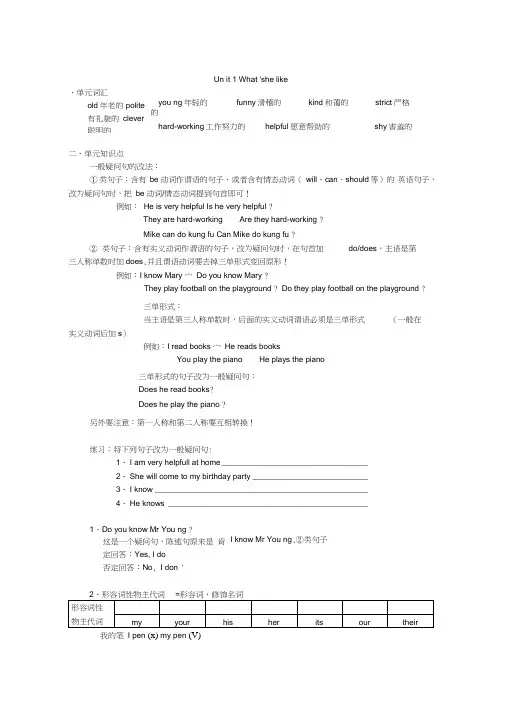
Un it 1 What 'she like 、单元词汇old年老的polite 有礼貌的clever 聪明的you ng年轻的funny滑稽的kind和蔼的strict严格的hard-working工作努力的helpful愿意帮助的shy害羞的二、单元知识点一般疑问句的改法:①类句子:含有be动词作谓语的句子、或者含有情态动词(will、can、should等)的英语句子,改为疑问句时,把be动词/情态动词提到句首即可!例如:He is very helpful Is he very helpful ?They are hard-working Are they hard-working ?Mike can do kung fu Can Mike do kung fu ?②类句子:含有实义动词作谓语的句子,改为疑问句时,在句首加do/does,主语是第三人称单数时加does,并且谓语动词要去掉三单形式变回原形!例如:I know Mary 宀Do you know Mary ?They play football on the playground ? Do they play football on the playground ?三单形式:当主语是第三人称单数时,后面的实义动词谓语必须是三单形式(一般在实义动词后加s)例如:I read books 宀He reads booksYou play the piano He plays the piano三单形式的句子改为一般疑问句:Does he read books?Does he play the piano ?另外要注意:第一人称和第二人称要互相转换!练习:将下列句子改为一般疑问句:1、I am very helpfull at home _________________________________2、She will come to my birthday party __________________________3、I know ________________________________________________4、He knows _____________________________________________1、Do you know Mr You ng ?这是一个疑问句,陈述句原来是肯定回答:Yes, I do否定回答:No, I don '我的笔I pen (x) my pen (V)I know Mr You ng,②类句子你的尺子you ruler (x) your ruler (V)____ pen 我的钢笔__________ parents 她的父母___________ h ouse 他们的房子3、Is your English teacher strict?原来的陈述句:My English teacher is strict,①类句子,所以改为疑问句只须把be动词提到句首即可,my 变为yourBe 动词+ 人+ 描述体貌特征或性格特点的形容词?意为“某人是 ......... 的吗?”肯定回答:Yes,人+ be动词否定回答:No,人+ be动词not例如:——Is your P.E. teacher funny?——Yes, he is——Are your parents strict ?——No, they aren 't 你的体育老师高吗?是的,她很高你的数学老师年轻吗?不,她不年轻4、如何询问别人某一学科的老师是谁?可以借用特殊疑问词who (谁)的帮助,Who ' s your +学科+ teacher ?意为"你的........ 老师是谁?”回答:Mr/Mrs/Miss + 姓氏例如:——Who is your English teacher ?——Miss Green——Who is your math teacher ?——Mr Ma5、what is he like ?在这句话中, like 不是“喜欢”的意思,而是“像....... 一样”的意思,因为like有两种词性:① 动词,意为“喜欢”,实义动词谓语,不能和be动词同时出现;I like hamburger ;I like apples and grapes② 介词,意为“像……一样”,可以跟在be动词后面作表语;Their child is like him His words are like wisdom询问别人的体貌特征或性格特点的句型:What ' s +某人+ like?,意为询问“某人是像……样的/某人怎么样?” 回答:He' s/She's+ 描述体貌特征或性格特点的形容词.例如:——What is she like?——She is tall and thin——What is your art teacher like ?——He is young and funny6、频率副词sometimes (有时候),usually (通常),often (经常),通常放在主语和动作之间I sometimes read books in the morningI often play football on the playgroundI usually do my homework at 8 o 'clock7、 m ust 是情态动词,情态动词后面跟谓语动词原形(两类谓语)He is tall and strongHe must be tall and strongShe is our new English teacherShe will be our new English teacher 8、 l et me help youLet sb do sth , sb = somebody (某人),sth = something (某事),意为"让某人做某 事”, sb 如果是人称代词,那必须得是宾格形式的Let 'sgo to school = let us go to school Let Mike help you Let him come inUnit 1 单元习题、选出不同类的单词,并将其序号填到题前的括号内。
小学五年级下册英语Unit1-6核心句子归纳
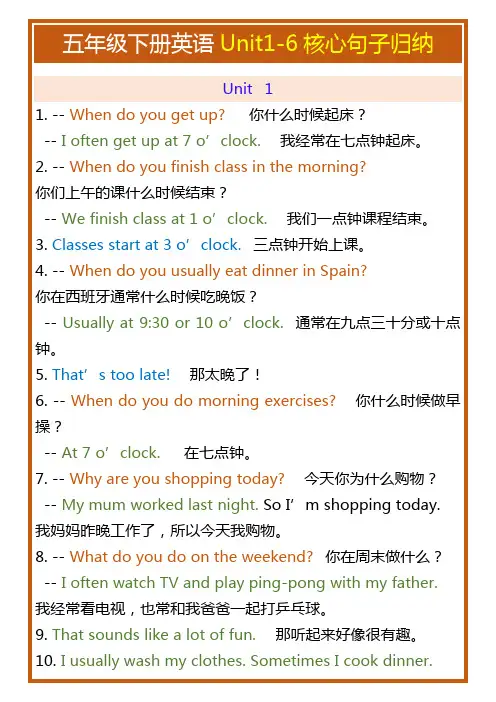
Unit1-6核心句子归纳Unit 11. -- When do you get up? 你什么时候起床?-- I often get up at 7 o’clock. 我经常在七点钟起床。
2. -- When do you finish class in the morning?你们上午的课什么时候结束?-- We finish class at 1 o’clock. 我们一点钟课程结束。
3. Classes start at 3 o’clock.三点钟开始上课。
4. -- When do you usually eat dinner in Spain?你在西班牙通常什么时候吃晚饭?-- Usually at 9:30 or 10 o’clock. 通常在九点三十分或十点钟。
5. That’s too late! 那太晚了!6. -- When do you do morning exercises? 你什么时候做早操?-- At 7 o’clock. 在七点钟。
7. -- Why are you shopping today? 今天你为什么购物? -- My mum worked last night. So I’m shopping today. 我妈妈昨晚工作了,所以今天我购物。
8. -- What do you do on the weekend? 你在周末做什么? -- I often watch TV and play ping-pong with my father. 我经常看电视,也常和我爸爸一起打乒乓球。
9. That sounds like a lot of fun. 那听起来好像很有趣。
10. I usually wash my clothes. Sometimes I cook dinner.我通常洗衣服。
有时我做晚饭。
11. You’re so busy! 你真忙!12. I often clean my room on Saturdays!我经常在星期六打扫我的房间!Unit 21. -- Which season do you like best? 你最喜欢哪个季节? -- Autumn. 秋天。
PEP五年级英语下册Unit1-6重点知识小结
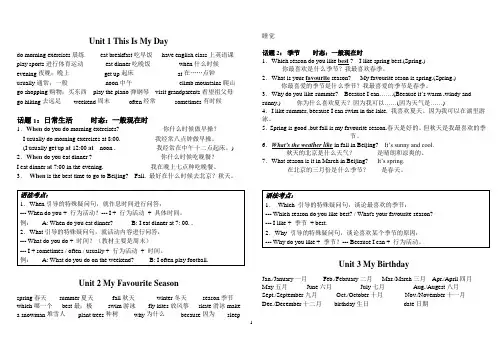
Unit 1 This Is My Daydo morning exercises晨练eat breakfast吃早饭have english class上英语课play sports进行体育运动eat dinner吃晚饭when什么时候evening夜晚;晚上get up起床at在……点钟usually通常;一般noon中午climb mountains爬山go shopping购物;买东西play the piano弹钢琴visit grandparents看望祖父母go hiking去远足weekend周末often经常sometimes有时候话题1:日常生活时态:一般现在时1.When do you do morning exercises? 你什么时候做早操?I usually do morning exercises at 8:00. 我经常八点钟做早操。
(I usually get up at 12:00 at noon . 我经常在中午十二点起床。
) 2.When do you eat dinner ? 你什么时候吃晚餐?I eat dinner at 7:00 in the evening. 我在晚上七点种吃晚餐。
3.When is the best time to go to Beijing? Fall. 最好在什么时候去北京?秋天。
Unit 2 My Favourite Seasonspring春天summer夏天fall秋天winter冬天season季节which哪一个best最;极swim游泳fly kites放风筝skate滑冰make a snowman堆雪人plant trees种树why为什么because因为sleep 睡觉话题2:季节时态:一般现在时1.Which season do you like best ? I like spring best.(Spring.)你最喜欢是什么季节?我最喜欢春季。
人教版五年级下册英语第一单元知识点
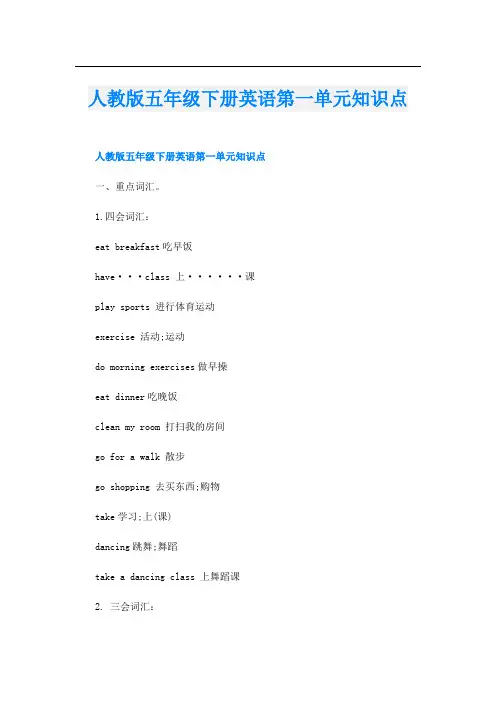
人教版五年级下册英语第一单元知识点人教版五年级下册英语第一单元知识点一、重点词汇。
1.四会词汇:eat breakfast吃早饭have···class 上······课play sports 进行体育运动exercise 活动;运动do morning exercises做早操eat dinner吃晚饭clean my room 打扫我的房间go for a walk 散步go shopping 去买东西;购物take学习;上(课)dancing跳舞;舞蹈take a dancing class 上舞蹈课2. 三会词汇:when什么时候 after 在(时间)后 start 开始 usually 通常地;惯常地Spain 西班牙 late 晚;迟a.m. 午前;上午p.m. 午后;下午why 为什么 shop 去买东西;购物 work 工作last 上一个的;刚过去的sound 听起来好像also 还;也 busy 忙的 need 需要 play 戏剧;剧本letter 信 live居住 island 岛always 总是;一直 cave 山洞;洞穴go swimming 去游泳 win 获胜二、其他日常活动。
get up起床eat lunch吃午饭go to bed 上床睡觉wash my face洗脸wash my clothes 洗我的衣服watch TV看电视play ping-pong打乒乓球play the pipa弹琵琶go swimming去游泳go running去跑步do homework 做作业do kung fu练武术play football踢足球play basketball打篮球三、频度副词。
always总是,一直(100%) usually通常(80%) often 经常(60%) sometimes(30%)有时四、疑问词。
人教版PEP英语五年级下册Unit1-My-Day知识点归纳与练习(含答案)
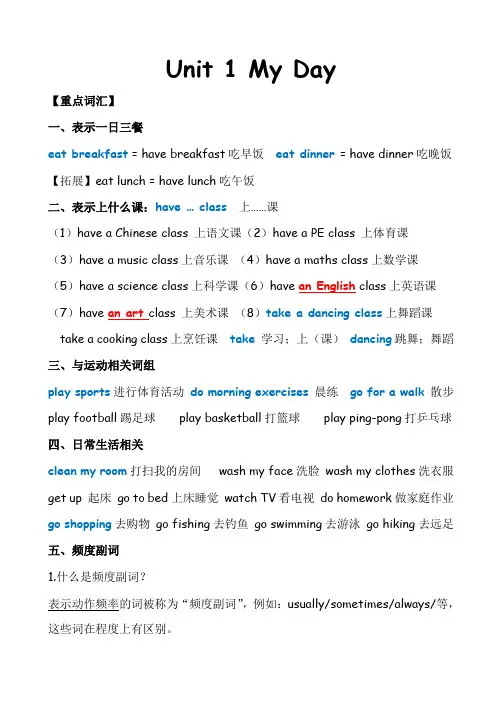
Unit 1 My Day【重点词汇】一、表示一日三餐eat breakfast = have breakfast吃早饭eat dinner= have dinner吃晚饭【拓展】eat lunch = have lunch吃午饭二、表示上什么课:have … class 上……课(1)have a Chinese class 上语文课(2)have a PE class 上体育课(3)have a music class上音乐课(4)have a maths class上数学课(5)have a science class上科学课(6)have an English class上英语课(7)have an art class 上美术课(8)take a dancing class上舞蹈课take a cooking class上烹饪课take学习;上(课)dancing跳舞;舞蹈三、与运动相关词组play sports进行体育活动do morning exercises晨练go for a walk散步play football踢足球play basketball打篮球play ping-pong打乒乓球四、日常生活相关clean my room打扫我的房间wash my face洗脸wash my clothes洗衣服get up 起床go to bed上床睡觉watch TV看电视do homework做家庭作业go shopping去购物go fishing去钓鱼go swimming去游泳go hiking去远足五、频度副词1.什么是频度副词?表示动作频率的词被称为“频度副词”,例如:usually/sometimes/always/等,这些词在程度上有区别。
2.常见频度副词按频率大小排列如下:always(100%)>usually(80%)>often(60%)>sometimes(20%~40%)> never (0%)3.注意频度副词的使用位置:①We usually go to school at seven in the morning.②What do you often do on the weekend?六、常见时间的表达方式1.at + 具体的几点钟;at noon在中午;at night在晚上2.in +月份/季节/早中晚例如:in the morning/afternoon/evening3.关于on表示时间的几种情况:①on + 星期几;②on + 几月几日;③on the weekend在周末;④on Monday morning星期一早上。
【知识学习】五年级英语下册第一单元单词及重点句型汇总
五年级英语下册第一单元单词及重点句型汇总Unit1wordList单词表cleanmyroom(打扫我的房间)domorningexercises(晨练)goforawalk(散步)eatbreakfast(吃早饭)takeadancingclass(上舞蹈课)goshopping(购物;买东西)haveEnglishclass(上英语课)eatdinner(吃晚饭)playsports(进行体育运动)when(什么时候)evening(夜晚;晚上)getup(起床)at(在……点钟)weekend(周末)always(总是,一直)often(经常)sometimes(有时候)usually(通常;一般)Unit1mainsentences主要句型.whendoyougetup?(你什么时候起床?)---Ioftengetupat7o’clock.(我经常在7点钟起床。
)2.whendoyoustartclassinSpain?(你在西班牙什么时候开始上课?)---Usuallyat9o’clock.(通常在9点钟。
)3.whatdoyoudoontheweekend?(你在周末做什么?)---IoftenwatchTVandplayping-pongwithmyfather.(我经常看电视,也常和我爸爸打乒乓球。
)4.Iusuallywashclothes.SometimesIcookdinner.(我经常洗衣服。
有时候我会做晚餐。
)5.Thatsoundslikealotoffun.(那样听起来很有趣。
)Unit1myday一、根据所给中文意思写单词。
______________________________________________________(打扫我的房间)(散步)(吃晚饭)______________________________________________________(上舞蹈课)(上英语课)(购物;买东西)______________________________________________________(吃早饭)(进行体育运动)(晨练)二、根据问句写答句。
五年级下册第一单元英语知识点
五年级下册第一单元英语知识点English:The first unit of Grade 5 covers a range of English language skills, including learning how to introduce oneself, talking about hobbies, expressing likes and dislikes, and describing daily routines. Students will also be introduced to vocabulary related to family members, numbers, and telling the time. They will practice using these new words and phrases in conversations and written exercises to improve their speaking, listening, reading, and writing abilities. Additionally, students will learn about simple present tense verbs and how to form questions and negative sentences. Through various interactive activities, games, and worksheets, students will have the opportunity to apply and reinforce the knowledge and skills they have learned in the classroom, enabling them to communicate effectively in English.中文翻译:五年级的第一个单元涵盖了一系列的英语语言技能,包括学习如何介绍自己,谈论爱好,表达喜好和厌恶,描述日常作息。
五年级下册英语第一单元知识点
五年级下册英语第一单元知识点一、词汇部分1. Days of the week- Monday- Tuesday- Wednesday- Thursday- Friday- Saturday- Sunday2. Activities- Go to school- Have class- Play games- Do homework- Watch TV- Read books- Go shopping- Visit grandparents3. Adverbs of frequency- Always- Usually- Often- Sometimes- Rarely- Never二、句型部分1. What do you do on weekends?- I play games on weekends.- I do homework on weekends.2. What does he/she do on weekends?- He/She watches TV on weekends.- He/She visits grandparents on weekends.3. What do they do on weekends?- They go shopping on weekends.- They read books on weekends.4. Adverbs of frequency in sentences- I always play games with my friends.- She usually does her homework after school.- We often watch TV in the evening.- They sometimes go shopping on weekends.- He rarely reads books.- She never visits her grandparents.三、语法部分1. Present simple tense- Affirmative: I/You/We/They + base form of the verb- Negative: I/You/We/They + do not + base form of the verb - Question: Do + I/You/We/They + base form of the verb? - He/She/It: follows the base form of the verb with 's' or 'es'2. Using adverbs of frequency- Adverbs of frequency are placed before the main verb in a sentence.3. Days of the week- Capitalize the first letter of each day of the week.四、阅读部分1. Short passages about weekend activities- Readingprehension questions related to the passages- Describing one's own weekend activities2. Matching activities with the days of the week- Matching the correct activity with the corresponding day of the week- Describing the activities of each day3. Writing about one's own weekend activities- Describing the activities one does on weekends using adverbs of frequency- Using simple present tense to talk about weekend activities五、口语部分1. Role-playing conversations- Conversations about weekend activities- Practicing asking and answering questions about weekend activities2. Describing weekend activities- Speaking confidently and fluently about one's own weekend activities- Using appropriate adverbs of frequency in speech六、写作部分1. Writing sentences using adverbs of frequency- Writing sentences about one's own activities using adverbs of frequency- Describing the frequency of various activities2. Short paragraph writing about weekend activities- Writing a short paragraph about one's own weekend activities - Using simple present tense and adverbs of frequency in writing总结五年级下册英语第一单元知识点主要包括词汇、句型、语法、阅读、口语和写作部分。
新人教部编版五年级下册英语Unit 1Cinderella单元知识点-译林版
Unit 1【词汇运用】名词:prince 王子的prince’sfairy 复数fairies 仙女(提问用who)clothes (复数)衣服mushroom 复数mushrooms动词:let 让lets, lettinghave to 不得不(三单has to)put on 穿上(反义词组take off)try on 试穿(三单tries on)fit 合适(三单fits)pick 摘(三单picks)understand 明白,理解(三单understands)leave ...behind留下,丢下(三单leaves...behind)疑问词:why连词:because, before(反义词after)【词组或短语】1. at the prince’s house在王子的宫殿2. come and help me 过来帮我3. my gloves 我的手套4. so sad 如此伤心5. put on the new clothes and shoes 穿上新衣服和鞋子6. come back 回来7. before 12 o’clock 在12点前8. have a good time/have a lot of fun 玩得开心9. at the party 在派对上10. have to go不得不走11. visit every house拜访每一间屋子12. try on the shoe试穿鞋子13. fairy tales童话故事14. remember these question words 记得这些提问词15. Monkey King美猴王16. have a drink喝一杯17. draw a dress for my friend 为我朋友画一条连衣裙18. have some snacks吃一些零食19. in the forest 在森林里20. find some mushrooms找到一些蘑菇21. hurry up快点22. look so nice 看起来如此漂亮23. pick a big and red mushroom采到一颗又大又红的蘑菇24. don’t understand不理解25. be bad for 对…有害26. What a pity! 真可惜!27. fit well 正合适28. put on his jacket 穿上他的夹克衫29. take off her coat 脱下她的外套30. go to the party 去参加聚会31. my foot hurts 我的脚疼32. under a tree 在树下33. all the girls 所有的女孩34. leave a shoe behind 丢下了一只鞋【语法】1. why引导的询问原因的特殊疑问句,其句式为“why+一般疑问句”,在回答时用“Because...”。
- 1、下载文档前请自行甄别文档内容的完整性,平台不提供额外的编辑、内容补充、找答案等附加服务。
- 2、"仅部分预览"的文档,不可在线预览部分如存在完整性等问题,可反馈申请退款(可完整预览的文档不适用该条件!)。
- 3、如文档侵犯您的权益,请联系客服反馈,我们会尽快为您处理(人工客服工作时间:9:00-18:30)。
五年级(下)Unit 11.单词:run 跑sorry 对不起,不好意思(道歉时用)jump 跳;跳跃sing 唱;演唱dance 跳舞sit 坐down 向下;朝下;沿着stand 站立;直立up 向上;在上面see 看见;明白;会见(过去式为saw)boy 男孩(复数boys)girl(复数girls) 女孩now 现在draw 画picture 图画;图片woman 女人(复数women) talk 交谈;讨论baby 婴儿(复数babies) cry 哭;哭泣;喊叫who 谁sleep 睡觉;入睡man 男人(复数men) hungry 饥饿的water 水tea茶(some tea 一些茶) candy 糖果(some candy一些糖果)train(火车)tree树(复数trees) window 窗户banana香蕉(复数bananas 一根香蕉a banana) dumpling饺子(通常使用的都是其复数形式dumplings)behind 在….之后tired 疲劳的,累的fruit水果(some fruit 一些水果) water 水(some water 一些水)swim游泳happy 高兴的sad 伤心的newspaper报纸paper纸card 卡片,纸牌(复数cards)find 发现,找到2.短语:go straight 直行turn left 左转turn right 右转ride a bike 骑自行车sit down坐下起立stand up站起来look at 看(某人或某物)look out of 从….向外看read the newspaper看报纸read a book /read books看书draw a picture /draw pictures 画画sing a song /sing songs 唱歌play football 踢足球play basketball 打篮球play ping-pong 打乒乓球play cards打扑克(with和…)watch TV看电视do my homework做作业have breakfast吃早餐have lunch吃午餐have dinner 吃晚餐take a picture / take pictures照相fly a kite / fly kites放风筝look out of the window 向窗户外面看wash my face 洗脸wash my hands 洗手make my bed 叠被子,整理床铺句子:3.祈使句:(祈使句是用来表达命令、请求、劝告、警告、禁止等的句子。
)祈使句肯定句句型结构:动词原形+其他.祈使句否定句句型结构:Don’t +动词原形+其他.肯定句:Please run . 跑。
Run, please.否定句:Please don’t run . 请不要跑。
Don’t run, please. 肯定句:Walk ,please .请步行。
否定句:D on’t walk,please . 请不要步行。
Please don’t jump . 请不要跳。
Please jump . 请跳。
Please don’t sing . 请不要唱歌!Please don’t sit down .请不要坐Please stand up .请站起来Don’t go straight .禁止直行. Don’t turn left . 禁止左转。
. Don’t ride a bike .不要骑自行车D on’t swim .不要游泳Don’t eat and drink . 不要吃或喝D on’t walk on the grass .不要踩踏草坪4.I’m excited! 我很兴奋5. 表达某人想做某事句型:(表主观上的想要,希望)句型结构:主语+ want/wants +to + 动词原形。
I want to go shopping!我想去购物。
I want to jump!我想跳表达某人想要某物句型:主语+ want/wants +名词.I want an apple. 我想要一个苹果。
He/She wants a banana.他/她想要一根香蕉。
6. 现在进行时:表示(说话瞬间)正在进行或发生的动作。
现在进行时的构成是:主语+be(not)+动词ing〔现在分词形式)(be动词随着主语的变化而变化)第一人称单数I+am+动词ing形式.第一人称复数We+are+动词ing形式.第二人称单(复)数You+are+动词ing形式第三人称单数He(She,it)+is+动词ing形式第三人称复数They+are+动词ing肯定句:主语+be(am/is/are)+现在分词否定句:主语+be(is/am/are)+not+现在分词一般疑问句:be(is/am/are)+主语+现在分词?特殊疑问句:What+相应be动词+主语+现在分词?现在分词的构成: (1)一般情况下在动词词尾加ing。
go(going)ask(asking)look(looking)play(playing) buy(buying) do(doing ) walk(walking) eat(eating) bring(bringing) throw(throwing) help(helping)watch(watching) jump(jumping) work(working)wash(washing) brush(brushing) look(looking)fly(flying) cook(cooking) clean(cleaning)(2)以不发音的e结尾的动词,去掉e加ing。
have(having) take(taking) make(making)write(writing) come(coming)(3)以一个辅音字母结尾的重读闭音节,双写最后一个字母,再加ing。
get(getting) sit(sitting ) put(putting)run(running) swim(swimming) shop(shopping)be动词随着主语的变化而变化例如:I am flying a kite.We are flying a kite.You are flying a kiteHe/She is flying a kite.They are flying a kite.What are you doing ?你正在干什么?I am drawing a picture . 我正在画画。
What is he/she doing ?他/她正在干什么?He/She is drawing a picture . 他/她正在画画。
What are they doing ?他们正在干什么?They are drawing a picture . 他们正在画画。
Jenny is looking out of the window on the train .詹妮正在火车上向窗户外面看。
7.某人看见某物:主语+see/sees+事物名词。
举例:I see many tall trees!我看见很多高的树!He/She sees many tall trees!他/她看见很多高的树!8. 某处有某物:There is/are…….There is a red school! 那有一座红色的学校。
There are four pen in my pencil box.在文具盒里有四支钢笔。
There are many people in the park .公园里有很多人人。
There are many students/pupils in the classroom.教室里有很多学生。
There are sixty (minutes) in an hour. 一小时有六十分钟。
There are twenty-four (hours) in a day. 一天有二十四小时。
There are seven (days) in a week.一周有七天。
There are three hundred and sixty-five (days) in a year.一年有三百六十五天。
There are twelve (months) in a year. 一年有十二个月。
9.What is Danny looking at? 丹妮正在看什么?Danny is looking at clouds.10.What are you doing now?你现在在干什么?I am drawing a picture . 我正在画画。
11.Are you singing?你在唱歌吗?NO,I’m not . 不,没有。
12. Who is talking?谁在说话?Danny is talking .丹妮在说话。
13. Who is hungry?谁饿了。
14.Would you like some fruit?你想吃点水果吗?Yes, please . 好的。
/ No,thanks .不了,谢谢。
15.I’m not hungry,and I’m not thirsty .我不饿,也不渴。
16.I’d like some candy .我想吃一些糖。
17.What is the woman doing now?这个女人在做什么?She ’s reading the newspaper .她正在读这张报纸。
